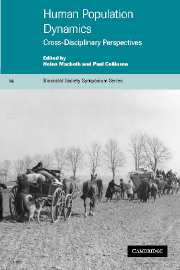Book contents
- Frontmatter
- Contents
- List of contributors
- Foreword by G.A. Harrison
- Preface
- 1 Introduction: the framework of studying human population dynamics
- 2 Demographic perspectives on human population dynamics
- 3 The growing concentration of world population from 1950 to 2050
- 4 Population, community and society in peasant societies
- 5 From genetic variation to population dynamics: insights into the biological understanding of humans
- 6 Social institutions and demographic regimes in non-industrial societies: a comparative approach
- 7 The dynamics of child survival
- 8 Genetic structure of south Indian caste populations: a confluence of biology and culture
- 9 Fertility, mortality and migration transitions in association with socioeconomic modernisation among highland minority populations in Southeast Asia
- 10 Ecology, homeostasis and survival in human population dynamics
- Glossary
- Index
- References
1 - Introduction: the framework of studying human population dynamics
Published online by Cambridge University Press: 11 August 2009
- Frontmatter
- Contents
- List of contributors
- Foreword by G.A. Harrison
- Preface
- 1 Introduction: the framework of studying human population dynamics
- 2 Demographic perspectives on human population dynamics
- 3 The growing concentration of world population from 1950 to 2050
- 4 Population, community and society in peasant societies
- 5 From genetic variation to population dynamics: insights into the biological understanding of humans
- 6 Social institutions and demographic regimes in non-industrial societies: a comparative approach
- 7 The dynamics of child survival
- 8 Genetic structure of south Indian caste populations: a confluence of biology and culture
- 9 Fertility, mortality and migration transitions in association with socioeconomic modernisation among highland minority populations in Southeast Asia
- 10 Ecology, homeostasis and survival in human population dynamics
- Glossary
- Index
- References
Summary
Humans can be studied from a variety of academic perspectives. In some biological disciplines the focus may be on parts of individuals, perhaps even molecular parts, while in others humans are considered zoologically as an entire species, Homo sapiens, in the order Primatii. Some biologists are concerned with the physiologically functioning body of an individual, while others are interested in world-wide human diversity, distribution and population groupings. Among the social sciences, the focus is also frequently on the group, but here the emphasis tends to be upon the social and cultural factors which underpin the way such phenomena as societies, communities and ethnic groups are constructed, delimited and defined. There are also the behavioural sciences, which utilise both biological and social information in relation to the study of the group, the individual or elements in the behaviour of the individual. Recognition of the number of perspectives on these population variables emphasises the need to study material across the boundaries of traditional academic disciplines and several of these perspectives are introduced in this volume.
The twentieth century began with observers of the human condition integrating, in what we now recognise to be a confused way, their ideas on the biological and social nature of humans. During the century the fragmentation of all disciplines grew, something exemplified most particularly in the divergence between biological and social pursuits of knowledge.
- Type
- Chapter
- Information
- Human Population DynamicsCross-Disciplinary Perspectives, pp. 1 - 16Publisher: Cambridge University PressPrint publication year: 2002



